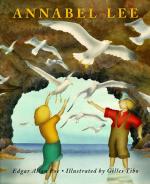|
This section contains 336 words (approx. 1 page at 400 words per page) |

|
In this brief essay, Empric delves into the psychological factors driving the poem's narrator.
The child's vision of reality is, in relation to the larger proportions and understanding of the adult mind, a vision of the grotesque. Time, for example, exists for the child as a present in which, somehow, past and future are simply amalgamated rather than sequential, separate entities. The narrator in "Annabel Lee" says he was a child when he knew and loved his child-bride. From the subsequent workings of his mind, the narrator's perspective seems to have changed little since that time. He has remained a child, because of inability or unwillingness to change, and this frozen perspective is lent a peculiar strength by the characteristic and simple cadences of the ballad form. The narrator tells his story until stanza three, when, in an attempt to account for the disproportion of his feelings...
|
This section contains 336 words (approx. 1 page at 400 words per page) |

|




